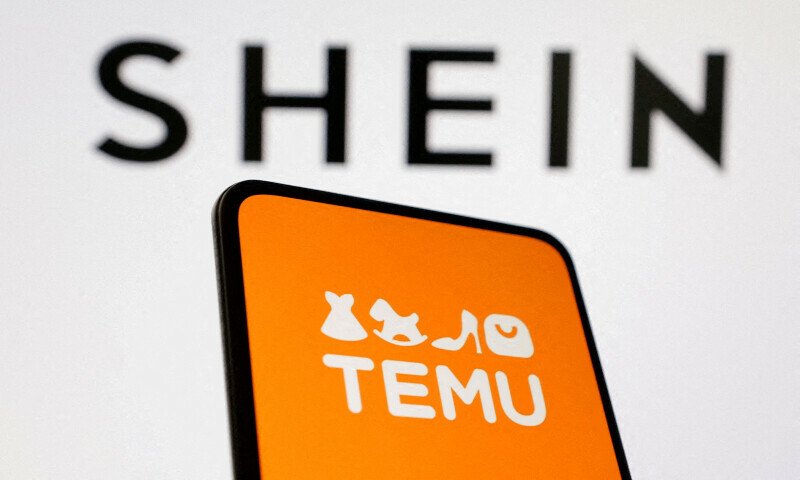Fast-growing speciality e-commerce sites such as Temu and its rival Shein are branching deeper into the business of selling toys as many American and European shoppers prepare to seek out steep bargains during the Black Friday weekend.
In previous years, Temu and Shein — which sell primarily from mobile phone-based apps — would not have been the usual places for shoppers to buy toys and other holiday gifts.
The sites face concerns from regulators and US-based consumer product makers about fakes and counterfeits.
The competing platforms serve as America’s digital “dollar stores”, offering mostly unbranded items, from bath towels and clothes to home appliances, at low prices.
Now both Temu and Shein are looking to win a bigger slice of the global market for toys, which fuel sales for retailers during the holiday season. Toys drove $108.7 billion in sales globally in 2023, according to market research firm Circana.
At Shein, which became popular selling $5 t-shirts and $10 sweaters, toys are one of the fastest-growing categories, a spokesperson for the site said. Toys have seen double-digit percentage growth in sales volume on Shein’s platforms year-over-year, the spokesperson said.
Temu said it is seeing an increase in searches for toys by prospective shoppers.
To be sure, major mass-merchandise retailers Amazon, Walmart and Target remain the mainstay for toy shoppers — together representing nearly 70 per cent of US toy sales, said Linda Bolton Weiser, a research analyst at DA Davidson.
Still, the share of US holiday shoppers planning to buy gifts on Temu this year stands at 13pc, up from 9pc last year, according to market research firm Kantar. Additionally, US credit card spending on both sites this month is up compared to 2023, according to data firm Facteus.
The recent surge in toy buying on Temu and Shein is getting the attention of US companies like LOL Surprise! doll maker MGA Entertainment, which sells its stuffed animals and figurines to traditional retailers like Target and Macy’s. MGA CEO Isaac Larian said the company would consider selling on the e-commerce platforms to reach more shoppers.
“We want to reach (all levels) of consumers, not just the people with average incomes,” he said.
Shein and Temu increasingly appeal to shoppers earning less than $50,000 per year, who have been squeezed by a surge in consumer prices since 2021. More low-income shoppers are making purchases online to find bargains, according to Bank of America credit card data ahead of the holiday shopping season.
In Europe, young shoppers aged 18 to 34 in particular are increasingly buying toys on Temu, Shein and rival Alibaba’s AliExpress platform, according to a September study by Circana covering France, Germany, Italy, Spain and the UK.
AliExpress also offers cheap made-in-China goods, such as toy guns for less than $1.
The study found 39pc of European consumers have bought toys or games on one of those sites since the start of this year. Among younger consumers, the figure stood at 60pc.
Worried about ‘dupes’
Barbie maker Mattel, however, does not directly sell to Temu or Shein and its distributors are not authorised to do so, according to a company spokesperson.
Still, listings on Temu for Mattel’s Uno card game and on Shein for its Hot Wheels toy cars featured badges and claims that the products are authentic.
A Shein spokesperson said its suppliers are required to certify their products do not infringe on a brand’s intellectual property and are not counterfeit. Shein has a team to ensure sellers comply with the policy and takes swift action if they are not, the spokesperson said.
A Temu spokesperson said it took down the Uno product listings after receiving questions from Reuters and that it would conduct a thorough investigation.
“This is part of our standard operating procedure for dealing with products suspected of non-compliance or subject of a complaint,” the Temu spokesperson said.
Enticed by lower fees to sell on the platforms, toy distributors like Popmarket have increasingly joined Shein and Temu’s online marketplaces.
Popmarket is selling more Funko Pop figurines, Hasbro, GI Joes and other toys on Shein than it initially expected, said Jeff Walker, CEO of Popmarket’s parent company Alliance Entertainment.
Compared with toy buyers on Amazon, Walmart and online retail marketplace eBay, Shein shoppers generally tend to purchase the lower-priced Popmarket toys, added Tim Hinsley, a retail executive at Alliance Entertainment.
Funko and Hasbro, which Shein has tried to recruit to its online marketplace, did not return requests for comment.
Shein is offering to waive fees for new sellers for the first three months, with a 10pc charge thereafter. Temu this month opened up applications to all US-based sellers — after previously requiring sellers join on invitation only, the company said.
Popmarket plans to start selling its toys on Temu after the holiday season, said Hinsley, adding that the distributor is working with toy makers to bring more of their products to the two platforms and ByteDance’s TikTok Shop, the e-commerce arm of the popular short video app.
“We didn’t have any manufacturer that flat out turned us down when we asked them to sell on Shein,” said Hinsley. “Everyone was pretty enthusiastic about having a new marketplace and reaching that demographic.”
Despite the rising popularity of Shein and Temu, MGA, like other toy makers, has concerns about so-called “dupes”, or fakes on both sites, particularly of its new Miniverse brand, named a top toy for the holidays by Walmart, Amazon and Target, Larian said.
The Chatsworth, California-based toy company’s attorneys are in discussions with Shein and Temu’s legal departments on how they can better police the knock-offs, Larian said.
He said the fake products could have improper age labels, and small pieces that could pose choking hazards for young children.
A spokesperson for Toronto-based toy maker Spin Master said that toys on Temu and Shein resembling its new “Ms Rachel” doll for infants as young as six months are “fake”, and that the company has concerns that those plush items have not undergone quality and safety testing.
A Temu spokesperson said that Spin Master contacted the platform on Nov. 8 about an intellectual property concern.
“We immediately investigated and removed the products in question,” the spokesperson said. The spokesperson said Temu added Spin Master to its proactive monitoring system which scans new posts from sellers to ensure the products listed do not match other companies’ intellectual property.
Mark Carson, the president of toymaker Fat Brain Toys, said he will closely watch Shein and Temu to see if he should begin selling his company’s toys on the sites.
“I’m not going to do it just because consumers are rushing there for the cheapest thing they could find,” he said. “It has to be something that works for us.”







